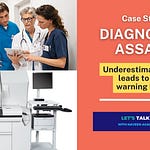Dear colleagues, hello! 👋
➡️What happens when a silent change in the dimensions of a syringe used in an infusion pump system leads to incompatibility issues? Well, it leads to operational problems for users, and avoidable safety risks to patients.
A recent Class I recall announcement from the FDA highlights the importance of applying a systems safety approach to medical device design, especially when components from different manufacturers are used to deliver life-saving or life-sustaining therapies. Learn more about this case study in this week’s premium article below.
➡️Rapid advancement in digital technologies and cloud computing offer huge opportunities for medical devices, but they are also forcing us to change our approach to design, development and risk management.
In this high energy Let’s Talk Risk! conversation Randy Horton inspires us to take a risk-based approach when building and managing connected devices.
➡️Risk (of harm) associated with the use of a medical device is characterized as a combination of the probability of occurrence and the severity of that harm. However, there is no clear guidance on how to combine the two during risk estimation. Generally speaking, there seems to be severity bias in the medical device industry when analyzing and evaluating risk.
This quick tip reminds us that both severity and probability are equally important. Risk practitioners should watch out for a severity bias during risk analysis.
Upcoming events
LTR weekly conversation on LinkedIn: Linking risk management with design controls
Join me next Friday, December 22, 2023 at 11:00 AM EST, for another Let’s Talk Risk! conversation on LinkedIn. My guest in our next session is Daniel Roberts who will share insights on how you can efficiently connect risk management with design controls.. Click below to learn more and add it to your calendar!
Pre-registration is now open for the next session of Live ISO 14971 training on ACHIEVE. Paid subscribers get 20% off regular price!
Save your spot here to join the next cohort of the LIVE ISO 14971 certification training course starting in January 2024. Watch a course introduction video and check out testimonials from past attendees!
Weekly Knowledge Challenge #13
I hope you enjoyed the knowledge challenge question last week. Here is the correct answer:
The correct answer for the question, “An auditor is insisting that your policy for criteria for risk acceptability must be to reduce risks to as far as possible (AFAP) to comply with ISO 14971. Are they correct?”, is “NO”.


















Share this post